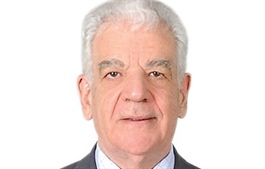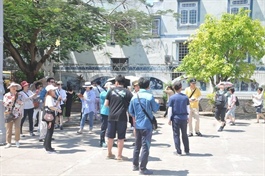Promoting a redesigned model for stable growth
Promoting a redesigned model for stable growth
The aftermath stemming from the pandemic has worsened global economic hardships but also opened up new potential. Dam Nhan Duc, head of Research and Corporate Development at Military Bank, shared with VIR’s Celine Luu how Vietnam can fully grasp the golden opportunities from multifaceted free trade agreements to be a magnet for high-quality overseas cash flow.

Dam Nhan Duc, head of Research and Corporate Development at Military Bank
|
What is the general consensus on current growth rates in Vietnam?
In the first half of 2020, Vietnam’s GDP increased by 1.81 per cent, lower than that in the same period last year, which was 6.8 per cent. However, this is an encouraging result in the context of global negative growth.
Domestic consumption demand accounting for 64 per cent of GDP in 2019 has been the key impetus for GDP growth. Compared to other nations in the world, the consumption rate of essential products, which accounts for 40 per cent of Vietnam’s GDP, is on the top rank. It is this consumption structure that partly eases the damages caused by the pandemic, together with efforts from the government and community.
In addition, Vietnam’s economy is open to the global economy. In the first six months of 2020, the import-export turnover was 2.2 times more than the GDP. Although COVID-19 has significantly impacted the world’s economies, Vietnam’s total import-export turnover in the first six months this year only decreased by 3.2 per cent per cent compared to the same period last year.
This is partly because consumer demand for essential products, especially Vietnamese agricultural and fishery products, in developed countries is less impacted by the pandemic, and will promote Vietnam’s export and import growth in the coming period.
What is the specific impact that free trade agreements (FTAs) are making?
According to calculations, the EU-Vietnam FTA will significantly boost Vietnam’s exports in particular and Vietnam’s economy in general.
In the new-generation FTAs, there are commitments on equal treatment between domestic and foreign investors in doing business. In addition, being a part of these types of FTAs means institutional and cross border policies will be more transparent and more consistent with international practices. Thanks to that, Vietnamese businesses can approach a better developed market and attract more investors, thereby improving the governance, management, and financial ability.
However, the competitiveness of the Vietnamese economy is not yet strong enough.
If Vietnam does not make efforts to reform and finalise the market economy, these may be barriers that prevent the inflow of quality foreign investment into Vietnam, thereby making it hard to improve the competitiveness.
What are some of the solutions for further economic growth in Vietnam?
Vietnam’s economy is still dependent on the progress of developing COVID-19 vaccines and the recovery of the world’s economy. Vietnam cannot stand alone and grow.
Foreign-invested enterprises (FIEs) that have always been the growth engine might encounter choppy waters in operating at full capacity as entering and exiting the country is still limited. Investment inflows and remittances are also likely to decline more than expected.
In this challenging context, the government has taken drastic actions to help the domestic economy weather the storm.
Firstly, the State Bank of Vietnam and commercial banks have introduced interest rate cuts to assist businesses. The SBV also aided commercial banks to restructure loans for businesses and individuals that are particularly hit hard by the pandemic.
Secondly, there have been efforts to increase public investment in order to support economic development. Promoting the disbursement of such capital is an urgent measure. However, it is important to ensure that the short-term economic stimulus measures do not harm fiscal and debt sustainability in the long run.
The government is implementing additional measures to support businesses, such as reducing tax, which is necessary, but not enough, as they only focus on the operating results. To achieve sustainable economic growth in the long term, Vietnam can consider innovating the growth model based on the three pillars of capital, labour, and technology. In addition to labour, I would like to emphasise the mobilisation of social capital.
The outbreak has fundamentally changed social behaviours and consumer trends. Therefore, the application of technological solutions to social and business operations is key. Besides that, the government should accelerate technological implementation in state management, especially public services for citizens.
How can increasing amounts of foreign direct investment (FDI) be lured in?
To continue to grow, it is necessary for Vietnam to proactively implement several solutions.
Firstly, it is necessary to continue to improve the investment environment and reform administrative procedures in order to create favourable conditions for investors in all stages, from applying for licenses to being granted legal investment certificates.
Secondly, it is of utmost imperative to prepare for industrial land with sufficient infrastructure and stable price policy which is suitable for each economic region. To do so, we need to encourage and create more conditions for developing industrial real estate so as to create a more ample industrial land bank with synchronous infrastructure that is ready to welcome overseas funds.
Thirdly, we need to prepare human resources and be ready to supply a large number of labourers with high qualifications to meet the demand of foreign investors in the era of the Fourth Industrial Revolution. Vietnam is a nation that is in the golden population stage. This is maybe the last chance for Vietnam to cash in on the prime time of this labour force to thrive.
Lastly, the current preferential policies to attract FIEs are applied to all types of businesses. We should have separate preferential policies for each type of FIE or for each certain area, as India and China already have done.
We need to implement fresh approaches quickly because it will help us determine the focus of FDI inflows by sectors, industries, and areas that we want to lure in. From that, we can come up with appropriate policies to compete with other countries.




















